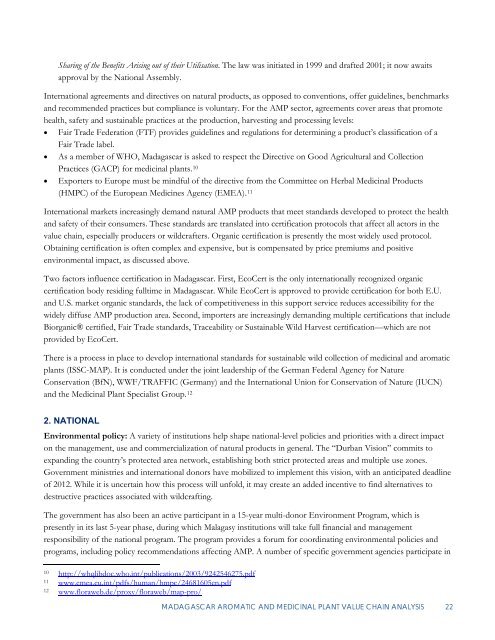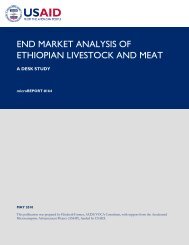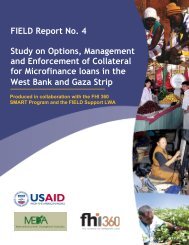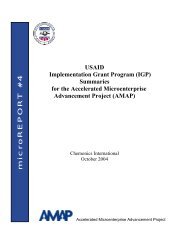Madagascar Aromatic and Medicinal Plants Value - Microlinks
Madagascar Aromatic and Medicinal Plants Value - Microlinks
Madagascar Aromatic and Medicinal Plants Value - Microlinks
Create successful ePaper yourself
Turn your PDF publications into a flip-book with our unique Google optimized e-Paper software.
Sharing of the Benefits Arising out of their Utilisation. The law was initiated in 1999 <strong>and</strong> drafted 2001; it now awaits<br />
approval by the National Assembly.<br />
International agreements <strong>and</strong> directives on natural products, as opposed to conventions, offer guidelines, benchmarks<br />
<strong>and</strong> recommended practices but compliance is voluntary. For the AMP sector, agreements cover areas that promote<br />
health, safety <strong>and</strong> sustainable practices at the production, harvesting <strong>and</strong> processing levels:<br />
• Fair Trade Federation (FTF) provides guidelines <strong>and</strong> regulations for determining a product’s classification of a<br />
Fair Trade label.<br />
• As a member of WHO, <strong>Madagascar</strong> is asked to respect the Directive on Good Agricultural <strong>and</strong> Collection<br />
Practices (GACP) for medicinal plants. 10<br />
• Exporters to Europe must be mindful of the directive from the Committee on Herbal <strong>Medicinal</strong> Products<br />
(HMPC) of the European Medicines Agency (EMEA). 11<br />
International markets increasingly dem<strong>and</strong> natural AMP products that meet st<strong>and</strong>ards developed to protect the health<br />
<strong>and</strong> safety of their consumers. These st<strong>and</strong>ards are translated into certification protocols that affect all actors in the<br />
value chain, especially producers or wildcrafters. Organic certification is presently the most widely used protocol.<br />
Obtaining certification is often complex <strong>and</strong> expensive, but is compensated by price premiums <strong>and</strong> positive<br />
environmental impact, as discussed above.<br />
Two factors influence certification in <strong>Madagascar</strong>. First, EcoCert is the only internationally recognized organic<br />
certification body residing fulltime in <strong>Madagascar</strong>. While EcoCert is approved to provide certification for both E.U.<br />
<strong>and</strong> U.S. market organic st<strong>and</strong>ards, the lack of competitiveness in this support service reduces accessibility for the<br />
widely diffuse AMP production area. Second, importers are increasingly dem<strong>and</strong>ing multiple certifications that include<br />
Biorganic® certified, Fair Trade st<strong>and</strong>ards, Traceability or Sustainable Wild Harvest certification—which are not<br />
provided by EcoCert.<br />
There is a process in place to develop international st<strong>and</strong>ards for sustainable wild collection of medicinal <strong>and</strong> aromatic<br />
plants (ISSC-MAP). It is conducted under the joint leadership of the German Federal Agency for Nature<br />
Conservation (BfN), WWF/TRAFFIC (Germany) <strong>and</strong> the International Union for Conservation of Nature (IUCN)<br />
<strong>and</strong> the <strong>Medicinal</strong> Plant Specialist Group. 12<br />
2. NATIONAL<br />
Environmental policy: A variety of institutions help shape national-level policies <strong>and</strong> priorities with a direct impact<br />
on the management, use <strong>and</strong> commercialization of natural products in general. The “Durban Vision” commits to<br />
exp<strong>and</strong>ing the country’s protected area network, establishing both strict protected areas <strong>and</strong> multiple use zones.<br />
Government ministries <strong>and</strong> international donors have mobilized to implement this vision, with an anticipated deadline<br />
of 2012. While it is uncertain how this process will unfold, it may create an added incentive to find alternatives to<br />
destructive practices associated with wildcrafting.<br />
The government has also been an active participant in a 15-year multi-donor Environment Program, which is<br />
presently in its last 5-year phase, during which Malagasy institutions will take full financial <strong>and</strong> management<br />
responsibility of the national program. The program provides a forum for coordinating environmental policies <strong>and</strong><br />
programs, including policy recommendations affecting AMP. A number of specific government agencies participate in<br />
10 http://whqlibdoc.who.int/publications/2003/9242546275.pdf<br />
11 www.emea.eu.int/pdfs/human/hmpc/24681605en.pdf<br />
12 www.floraweb.de/proxy/floraweb/map-pro/<br />
MADAGASCAR AROMATIC AND MEDICINAL PLANT VALUE CHAIN ANALYSIS 22





